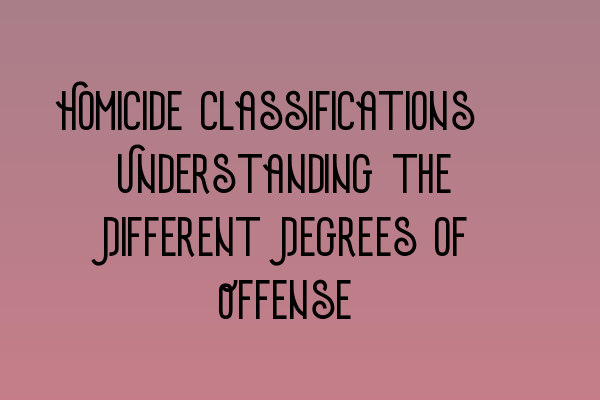Homicide Classifications: Understanding the Different Degrees of Offense
As criminal solicitors at SQE Criminal Law & Practice Law UK, we understand that navigating the complex world of homicide can be challenging. With various degrees of offense and classifications in place, it is vital to gain a clear understanding to ensure that justice is served efficiently and effectively. In this article, we will provide an in-depth analysis of the different degrees of homicide offenses and shed light on their legal implications.
First-Degree Murder
First-degree murder is the most serious form of homicide, involving deliberate and premeditated acts of killing. This degree of offense is often characterized by intent, planning, and a high level of malice aforethought. It generally carries the strictest penalties under the law, including life imprisonment without the possibility of parole or even the death penalty in some jurisdictions.
Second-Degree Murder
Second-degree murder differs from first-degree murder in that it lacks the element of premeditation. However, it still involves intent to cause harm or commit a dangerous act that ultimately results in the victim’s death. This degree of offense generally carries significant penalties, ranging from lengthy prison terms to life imprisonment, depending on the jurisdiction and circumstances surrounding the case.
Voluntary Manslaughter
Voluntary manslaughter is a lesser degree of offense compared to first-degree and second-degree murder. It involves intentional killing, but with mitigating circumstances that reduce the level of culpability. These circumstances often include provocation, a sudden and extreme emotional response, or a genuine belief in the need for self-defense. Penalties for voluntary manslaughter vary but generally include substantial prison terms.
Involuntary Manslaughter
Involuntary manslaughter refers to unintentional killings resulting from reckless or negligent behavior. Unlike voluntary manslaughter, there is no specific intent to cause harm or kill. Instead, the offender’s actions or failure to act, which demonstrates a disregard for human life, lead to the victim’s death. Negligent driving resulting in a fatal accident is a common example of involuntary manslaughter. Penalties for involuntary manslaughter typically include imprisonment and other appropriate punishments.
Infanticide
Infanticide is a unique offense that involves the unlawful killing of an infant under specific circumstances. This offense recognizes the distinct vulnerabilities faced by new mothers suffering from postnatal depression or other similar conditions. By providing a defense for these women, the law aims to address the complex interplay of psychological and societal factors surrounding such cases. Penalties for infanticide vary by jurisdiction and can include imprisonment or mental health treatment.
Conclusion
Understanding the different degrees of homicide offenses is crucial for anyone involved in criminal law. Whether you are studying for the SQE 1 or SQE 2 exams, or seeking legal representation, having a comprehensive grasp of these classifications will greatly benefit your understanding and practice. For more information, feel free to explore our related articles:
